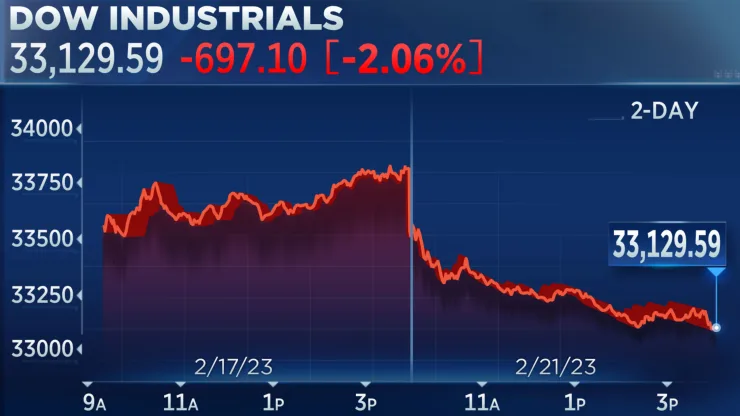U.S. stocks dropped Tuesday as higher rates continue to pressure market sentiment, and the latest batch of retail earnings raised concerns about the state of the consumer.
The Dow Jones Industrial Average dropped 697.10 points, or 2.06%, to close at 33,129.59. This was the index’s worst downturn since Dec. 15, when it fell 2.3%. The S&P 500 slid 2.00% to close 3,997.34, marking its worst day since Dec. 15, when it fell 2.5%. All sectors ended lower, with consumer discretionary stocks seeing the largest decline of 3.3%. The tech-heavy Nasdaq Composite pulled back by 2.50%, ending at 11,492.30.
The benchmark 10-year Treasury yield climbed to 3.9%, while the 2-year rate advanced to 4.7%. Both rates also reached levels not seen since November, as traders grappled with hotter-than-expected inflation data. Traders are worried that stubborn inflation will lead the Federal Reserve to keep rates higher for longer — which could tip the economy into a recession.
“I think it’s the equity markets that finally caught up to what the Treasury markets have been saying for a couple of weeks,” said B. Riley Wealth’s chief market strategist Art Hogan. “We’ve had a string of better-than-expected economic data. With every new data point, we saw a tick up in yields in the Treasury market.”
Hogan added that rather than one major catalyst for the market downturn, the cumulative effect of the data and the Fed’s messaging caused investors to take notice.
“Now, I think the equity market is catching up to the fact that the Fed speakers mean business, and this data may well mean higher-for-longer interest rates … It’s just a catch-up that was overdue,” he continued.
Home Depot was the worst-performing Dow member, losing 7% after the home improvement retailer posted weaker-than-expected revenue for the fourth quarter. The company also issued a muted outlook.
The Fed on Wednesday is scheduled to release the minutes from its Jan. 31-Feb. 1 meeting. The central bank hiked rates by 25 basis points at that gathering.

